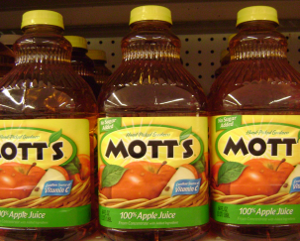
Workers at Mott’s Williamson, NY plant had been on strike all summer. At issue was a demand by management that workers accept pay freezes, benefits cuts, and other concessions. U.S. Secretary of Labor, Hilda Solis, advocated for the two sides to negotiate a settlement, although Mott’s announced last week, it was done negotiating. The unionized workers have now given in and accepted the final deal on the table rather than risk unemployment.
The situation that played out here was the question of which side had a greater need. Mott’s parent company made $555 million last year and isn’t claiming they couldn’t afford the worker’s current pay rate. Rather, they recognized that the market would bear a cheaper compensation rate, which bolstered their bottom line and profits for their shareholders. In the spirit of good business, if they could do the job cheaper elsewhere without compromising product quality, worker safety, or other legal issues, then it seems they rightfully owed it to their stock owners to do that.
The worker’s case was harder to make as an economic argument. Granted, it’s an emotional slam dunk. These are long-service employees, many of whom have spent their entire adult lives with Mott’s. They feel a loyalty to the company, and feel rightfully betrayed that the company is not reciprocating. Further, these are real people. People with families to support. People who would not likely be able to leave Mott’s and be hired elsewhere at the pay rate they’ve come to enjoy. This was a potentially life altering event for the community.
However, Mott’s is a business. It is not going to make decisions based on emotion. It clearly doesn’t value the workers’ experience or its reputation in the community. It wants the cash and had figured out how to get it. This, in microcosm, is a story playing out in plants and offices all over the country. If anything, Mott’s is a little late to the game. For everyone clamoring for unregulated, unimpeded, unadulterated capitalism, here it is.
Yet there are economy-wide implications of these decisions. The best thing for each company at an individual level may be lower wages or even offshore labor. But collectively, these companies are financially hobbling the very consumers they ultimately need to buy their products. After all, consumer spending accounts for 60-70% of the U.S. economy. But if employers continue to whittle away the income of the middle class, much of this consumer spending will decrease out of necessity.
In Mott’s case in particular, applesauce and apple juice are middle American staples. If the rich get richer, they aren’t going to spend that windfall on juice drinks. So while Mott’s may not be dependent on their own employees as customers, they are dependent on people like their employees throughout America.
Viewed in this light, companies do have an interest in their employee’s financial well being beyond incenting productivity in the workplace. But it is in each company’s best interest to squeeze their own workers and count on everyone else to show their largess. Especially in a tight economy, no company wants to be the one to give first, or give more.
This is one of the key reasons labor unions came into being. They provided a counter balance to the inherent greed of the individual company. They made tangible the greater good of a strong middle class, and were largely responsible for its emergence during the 50’s and 60’s. However, it’s not clear the unions of the post-WWII era are adequate to the task any longer. Between the available global workforce and the high domestic unemployment rates, there is no longer a viable threat that companies won’t be able to hire people for jobs, and this was a union’s greatest lever. But rather than abandoning the middle class and plunging into a raw capitalist economy, why not structure a new system of regulatory and financial incentives to balance shareholder profits with middle class growth?
Still, a new system is a long term goal. Getting there will require legislation our current corporately owned Congress is unlikely to pass. But as voters, let’s try to move them in that direction. The middle class is what has defined the golden years of America. If it goes away, so does much of what has made our country what we are so proud of today.
